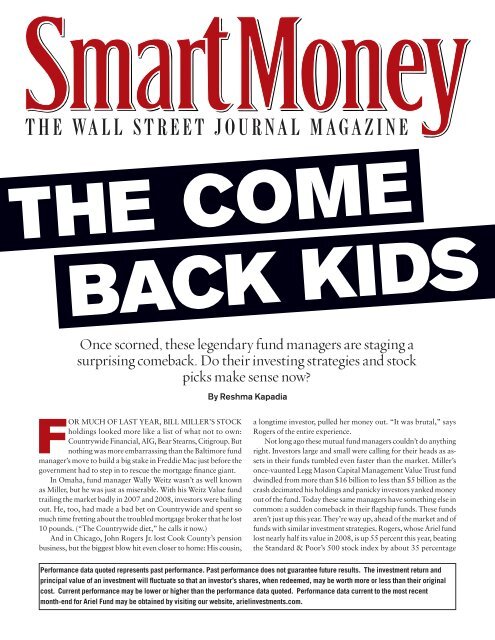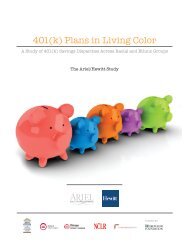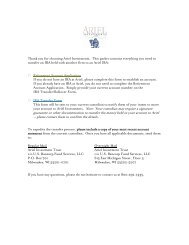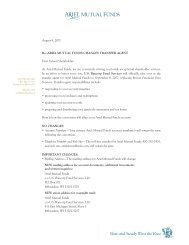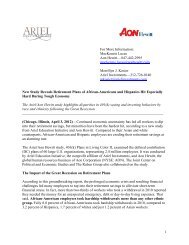Once scorned, these legendary fund managers ... - Ariel Investments
Once scorned, these legendary fund managers ... - Ariel Investments
Once scorned, these legendary fund managers ... - Ariel Investments
You also want an ePaper? Increase the reach of your titles
YUMPU automatically turns print PDFs into web optimized ePapers that Google loves.
The Comeback Kids<strong>Once</strong> <strong>scorned</strong>, <strong>these</strong> <strong>legendary</strong> <strong>fund</strong> <strong>managers</strong> are staging asurprising comeback. Do their investing strategies and stockpicks make sense now?By Reshma KapadiaFor much of last year, Bill Miller’S STOCKholdings looked more like a list of what not to own:Countrywide Financial, AIG, Bear Stearns, Citigroup. Butnothing was more embarrassing than the Baltimore <strong>fund</strong>manager’s move to build a big stake in Freddie Mac just before thegovernment had to step in to rescue the mortgage finance giant.In Omaha, <strong>fund</strong> manager Wally Weitz wasn’t as well knownas Miller, but he was just as miserable. With his Weitz Value <strong>fund</strong>trailing the market badly in 2007 and 2008, investors were bailingout. He, too, had made a bad bet on Countrywide and spent somuch time fretting about the troubled mortgage broker that he lost10 pounds. (“The Countrywide diet,” he calls it now.)And in Chicago, John Rogers Jr. lost Cook County’s pensionbusiness, but the biggest blow hit even closer to home: His cousin,a longtime investor, pulled her money out. “It was brutal,” saysRogers of the entire experience.Not long ago <strong>these</strong> mutual <strong>fund</strong> <strong>managers</strong> couldn’t do anythingright. Investors large and small were calling for their heads as assetsin their <strong>fund</strong>s tumbled even faster than the market. Miller’sonce-vaunted Legg Mason Capital Management Value Trust <strong>fund</strong>dwindled from more than $16 billion to less than $5 billion as thecrash decimated his holdings and panicky investors yanked moneyout of the <strong>fund</strong>. Today <strong>these</strong> same <strong>managers</strong> have something else incommon: a sudden comeback in their flagship <strong>fund</strong>s. These <strong>fund</strong>saren’t just up this year. They’re way up, ahead of the market and of<strong>fund</strong>s with similar investment strategies. Rogers, whose <strong>Ariel</strong> <strong>fund</strong>lost nearly half its value in 2008, is up 55 percent this year, beatingthe Standard & Poor’s 500 stock index by about 35 percentagePerformance data quoted represents past performance. Past performance does not guarantee future results. The investment return andprincipal value of an investment will fluctuate so that an investor’s shares, when redeemed, may be worth more or less than their originalcost. Current performance may be lower or higher than the performance data quoted. Performance data current to the most recentmonth-end for <strong>Ariel</strong> Fund may be obtained by visiting our website, arielinvestments.com.
THE COMEBACK KIDSpoints. Now the <strong>Ariel</strong> <strong>Investments</strong> founder is getting stopped onthe street—not for a tongue-lashing but for kudos.Veteran <strong>fund</strong> <strong>managers</strong>, of course, grow used to the market’sups and downs; there have been six bear markets since 1970 andmore than 800 days in the past decade alone when the Dow JonesIndustrial Average closed up or down more than 100 points. Value<strong>managers</strong> in particular pride themselves on their ability to takesome hard knocks. After all, their investing philosophy calls forbuying stocks no one else wants to touch, sometimes waiting yearsto reap the rewards. Still, this was different. Many were blindsidedby the scope of the credit crisis and caught holding stocks that lostalmost all their value, seemingly overnight. As a result, they fell tothe bottom of their categories in performance, with Miller—thebest known of the bunch for his 15-year record of beating the S&P500—losing 55 percent last year.How did they pull through? Luck played a part. No one predictedlast March, when the market was hitting new lows andmany investors were pulling out, that the next six months wouldsee one of the sharpest rallies in market history. But perseverancealso helped. Rather than change tactics, <strong>these</strong> <strong>managers</strong> kept at it,sometimes commiserating with each other in e-mails and phonecalls or, in the case of Rogers and Miller, over a steak dinner atGibsons in Chicago. “Everyone wants a magic bullet, and it’s goodthey didn’t look for one,” says Michael Breen, an analyst at <strong>fund</strong>researcher Morningstar. “The worst thing is to change stripes inthe midst of this.”Some investors are holding their applause. Even with this year’srebound, the reputations of <strong>these</strong> <strong>managers</strong> have been tarnished,and many of their investors still haven’t recovered from last year’slosses. Other popular value <strong>fund</strong>s like Dodge & Cox Stock andLongleaf Partners also fell sharply in 2008, and recent gains offerlittle comfort to advisers like Chuck Bender, a planner at The FinancialConsulate in Hunt Valley, Md. Many value <strong>fund</strong>s “didn’tdo what we had looked for, and that is, protect us as the marketfell,” he says.We tracked down Miller, Rogers and Weitz to see what theylearned from the crash and what they’re betting on now.Bill Miller’s life doesn’t exactly scream“comeback.” The veteran investor still carries the burden of thepast two years, literally, having gained 25 pounds. His calendar isfilled with weeks on the road trying to win back disgruntled clients.And he’s still up late into the night, poring over academic papersand books about financial crises, searching for insight on wherewe go from here.But Miller’s Value Trust <strong>fund</strong> is back—at least for now—trouncing81 percent of his peers this year. That’s still not enough to makeup for last year’s fiasco, but it gives him some relief on other fronts:Aggrieved investors no longer berate him at Orioles baseball games,and his brother has stopped offering to send along angry commentsthat pop up on Google alerts. Miller’s 15-year streak of beating themarket ended in 2006, when he missed out on the bull market inenergy stocks. Last year, of course, was even worse. And it wasn’tjust a matter of a few bad picks. Miller made a <strong>fund</strong>amental misjudgmentabout the financial crisis: He didn’t think it would be sobad. When the world’s financial system deteriorated to the brink ofcollapse, he was stuck with stocks worth just a fraction of what hepaid for them. “We relied too much on history,” he says. “You’realways a captive of your past.”Today a person close to him describes the 59-year-old manageras “intellectually humbled.” Although his strategy still draws fromareas as diverse as philosophy and behavioral finance, he’s challenginghis assumptions more <strong>these</strong> days. His portfolio bears littleresemblance to what it looked like a year ago. Instead of making bigbets on a small number of sectors, Value Trust now owns shares ofcompanies in almost every area of the market, including Aetna, IBMand Sears. That should make the <strong>fund</strong> less prone to wild swings.But Miller has another reason for spreading his bets: He says thatin the wake of the crash, he found bargains almost everywhere. Hestill sees bargains, partly because he believes the recovery “is goingto be a lot stronger” than most investors are expecting.Still, Miller sometimes wishes he had retired while he wasahead. His stumbles hurt not just his reputation but the firm’s aswell. Now Legg Mason is putting together a succession plan forMiller and other <strong>fund</strong> <strong>managers</strong>, though Miller and Legg Masonsay they have no plans for an abrupt parting. Miller says all he cando now is keep looking for good stocks. For inspiration he has anew fan: a bulldog named Jake LaMotta, after the boxer knownfor his ability to take a beating and keep going.John Rogers Jr. was staying put. When consultantsurged him to take less risk and diversify his holdings, theChicago <strong>fund</strong> manager all but thumbed his nose at their advice.Instead of growing more cautious, he plowed more money intohis favorite stocks, like real estate firm Jones Lang LaSalle andcruise giant Royal Caribbean. With a historic rally lighting a firebeneath his concentrated portfolio of just 32 stocks, the result wasone of the best six months of Rogers’s career: <strong>Ariel</strong> <strong>fund</strong> was up 35percent in the second quarter and another 34 percent in the thirdquarter. Some individual holdings have done even better. Gannett,considered by many a struggling media company, has more thantripled since <strong>Ariel</strong> doubled its stake in the spring.The 51-year-old <strong>fund</strong> manager didn’t look so smart at the beginningof the year. The son of a civil-rights activist, he couldn’t evenget a break when he traveled to Washington for the inauguration ofhis friend Barack Obama—Rogers’s office kept calling with news
The THE Comeback COMEBACK Kids KIDSFor extendedinterviews with<strong>these</strong> <strong>managers</strong>,go to www.smartmoney.com.Photograph by Michelle Nolan for SmartMoneyJohn Rogers Jr.<strong>Ariel</strong> <strong>fund</strong> (ARGFX)2008 return: –48%2009 year-to-datereturn: 55%Top holdings: JanusCapital Group, Hospira,Jones Lang LaSalle,Hewitt Associates, CBRichard EllisTotal Return (%)6050403020100-10-20-30-40Dec08<strong>Ariel</strong> FundS&P 500Jan Feb09 09Mar09Apr09May Jun Jul Aug Sep09 09 09 09 09SOURCE: BLOOMBERGabout <strong>Ariel</strong>’s tumbling portfolio. And it got worse from there. Hispoor performance led some of his longtime clients to yank theirmoney out of his <strong>fund</strong>, and it was hard not to be offended. “It’spersonal when people fire you,” Rogers says. “They are saying yourlife’s work is not worth anything.”The doubters haven’t exactly gone away. Even with this year’srally, his firm’s assets are down to $4.8 billion, from $21 billionin 2004—a combination of heavy losses and customer withdrawals.Some analysts question whether stocks, especially those in theconsumer and financial-services sectors that Rogers favors, cankeep powering ahead after months of gains. “Rising tides lift allships,” says Tom Roseen, senior research analyst at Lipper. Thequestion, he says, is what happens when the market slows down.Rogers says he isn’t worried. People are focusing on “what theyhave been through and aren’t yet realizing the potential upside,”he says. With companies slashing costs and investor expectationsstill dimmed, he says even modest revenue growth would generatesignificant gains in his holdings.That doesn’t mean Rogers hasn’t learned a lesson or two. Aftergetting hammered by his investments in acquisitive newspaper companiessuch as McClatchy and Lee Enterprises, he’s taking a muchmore skeptical view of takeovers—and pressuring management todo the same. He has also decided to step up his visits with companies,hitting the road in recent months to meet with top executives ofGannett, Janus Capital and CB Richard Ellis. The result, he says, ismore confidence in his picks. Even if the economy backtracks, Rogerssays his holdings could take the heat, especially since many havecleaned up their balance sheets. And if they take another beating?“We will do our homework again and be in there buying,” he says.Wally Weitz may be having a good year, butthat doesn’t make him upbeat about the market’s rebound. Aboutone-fifth of his <strong>fund</strong> is sitting in cash, and he’s in no rush to investit. If the market falls, he reasons, there will be better opportunitiesin the future.The plainspoken money manager, who favors plaid shirts andfollows Warren Buffett, expects an uneven recovery, with “investorsexperiencing wide mood swings between hope and disappointment.”He says the result could be a volatile market that essentiallygoes sideways, possibly for years. For Weitz, that may mean more
THE COMEBACK KIDStrading to lock in gains and capitalize on shorter-term opportunities.He’s already taking that approach with educationstocks like Apollo Group. At the same time, he’s sticking withsome longtime favorites, such as Liberty Media and Buffett’sBerkshire Hathaway. Both helped the Weitz Value <strong>fund</strong> gain24 percent this year, beating the market by two percentagepoints.Other longtime holdings were victims of the financial crisis.Two years ago Weitz began to reassess his case for his financialstocks as the housing downturn accelerated. The result: Countrywidehad to go, followed by mortgage giants Fannie Maeand Freddie Mac and insurer American International Group.It took almost nine months—and many restless nights—forWeitz to get rid of the forbidden four. “Over the years we hadbeen rewarded for sticking with dicey-looking situations,” saysWeitz, who says he made 20 times his money in Countrywidein the past. “Maybe we were all a bit stubborn.”These days Weitz’s team is doing more legwork, doublecheckingassumptions and digging deeper into the fine print ofcompanies’ debt obligations. But some things didn’t change,such as the <strong>fund</strong>’s penchant for stocks trading below their trueworth and his patience in holding them until they pay off. Indeed,as clients grilled Weitz on lessons learned in the crash,he realized that sidestepping the crisis completely “would havemeant having a mind-set and a way of operating that wouldhave kept us from setting our records in the first place.”That kind of thinking strikes some investors as a bit stale,especially given today’s fast-moving, unpredictable markets.Westport, Conn., financial planner Vern Hayden, whodumped mutual <strong>fund</strong>s managed by Weitz and Miller in 2007,prefers <strong>fund</strong>s with a more flexible, go-anywhere approach.“Managers get trapped in their own style,” he says. “I understandthey are trying to be consistent, but I don’t think theirs is thebest approach now.”Weitz, who bought his first stock when he was 12 years old,has no intention of veering from his value-first method. But heknows it will take more than one good year to restore his reputation.“Nobody is doing any victory dances,” he says. eReprinted from the December2009 issue of SmartMoney. <strong>Ariel</strong> <strong>Investments</strong> had no influence on the editorial content of this article.SmartMoney does not endorse any product or service of <strong>Ariel</strong> <strong>Investments</strong>. Reprinted by permission of SmartMoney.Copyright © 2009 SmartMoney. SmartMoney is a joint publishing ventureof Dow Jones & Company, Inc. and Hearst SM Partnership.All Rights Reserved Worldwide.This article was written for the December 2009 edition of SmartMoney. The information in this article is not guaranteed as to its accuracy or completeness.Information was current as of the date of this reprint and is subject to change. Investing in small and mid-cap stocks is more risky and more volatilethan investing in large cap stocks. As of September 30, 2009, <strong>Ariel</strong> <strong>Investments</strong>, LLC had over $4.8 billion in assets under management. The currentperformance (55%) shown in the article represents the year-to-date performance through October 23, 2009. For the period ended September 30, 2009, the averageannual total returns of <strong>Ariel</strong> Fund for the one-, five-, and ten-year periods were -0.36%, -1.36% and 6.37% respectively. <strong>Ariel</strong> Fund had an annual expense ratio of1.07% as of September 30, 2008 and an annual expense ratio of 1.14% for the year ended September 30, 2009. The performance of any single portfolio holding is noindication of the performance of other portfolio holdings of <strong>Ariel</strong> Fund or of the performance of the Fund itself. As of September 30, 2009, <strong>Ariel</strong> Fund held the followingpositions referenced: Gannett Co., Inc., 5.6%, McClatchy 0.0%, Lee Enterprises, 0.0%, Janus Capital Group Inc. 4.0%, CB Richard Ellis Group, Inc., 3.5%, RoyalCaribbean Cruises Ltd. 3.3%, Jones Lang LaSalle Incorporated, 4.2%, Hospira, Inc. 4.2% and Hewitt Associates, Inc. 4.8%. Investors should consider carefully theinvestment objectives, risks, and charges and expenses before investing. For a current prospectus which contains this and other information about the <strong>fund</strong>s offeredby <strong>Ariel</strong> Investment Trust, call us at 800-292-7435 or visit our website, arielinvestments.com. Please read the prospectus carefully before investing. Distributed by<strong>Ariel</strong> Distributors, LLC, a wholly-owned subsidiary of <strong>Ariel</strong> <strong>Investments</strong>, LLC.


